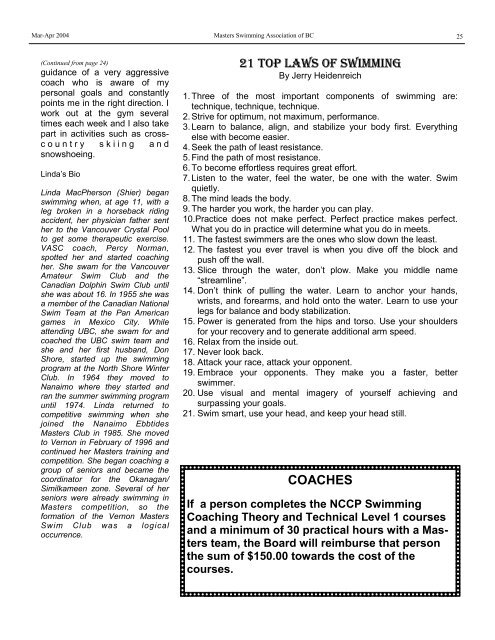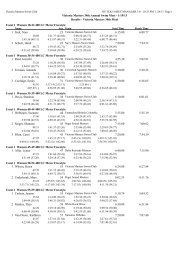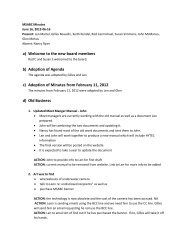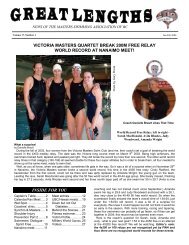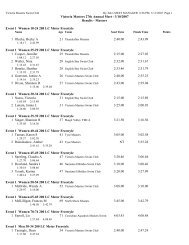Great Lengths - Masters Swimming Association of British Columbia
Great Lengths - Masters Swimming Association of British Columbia
Great Lengths - Masters Swimming Association of British Columbia
Create successful ePaper yourself
Turn your PDF publications into a flip-book with our unique Google optimized e-Paper software.
Mar-Apr 2004<br />
<strong>Masters</strong> <strong>Swimming</strong> <strong>Association</strong> <strong>of</strong> BC 25<br />
(Continued from page 24)<br />
guidance <strong>of</strong> a very aggressive<br />
coach who is aware <strong>of</strong> my<br />
personal goals and constantly<br />
points me in the right direction. I<br />
work out at the gym several<br />
times each week and I also take<br />
part in activities such as crosscountry<br />
skiing and<br />
snowshoeing.<br />
Linda’s Bio<br />
Linda MacPherson (Shier) began<br />
swimming when, at age 11, with a<br />
leg broken in a horseback riding<br />
accident, her physician father sent<br />
her to the Vancouver Crystal Pool<br />
to get some therapeutic exercise.<br />
VASC coach, Percy Norman,<br />
spotted her and started coaching<br />
her. She swam for the Vancouver<br />
Amateur Swim Club and the<br />
Canadian Dolphin Swim Club until<br />
she was about 16. In 1955 she was<br />
a member <strong>of</strong> the Canadian National<br />
Swim Team at the Pan American<br />
games in Mexico City. While<br />
attending UBC, she swam for and<br />
coached the UBC swim team and<br />
she and her first husband, Don<br />
Shore, started up the swimming<br />
program at the North Shore Winter<br />
Club. In 1964 they moved to<br />
Nanaimo where they started and<br />
ran the summer swimming program<br />
until 1974. Linda returned to<br />
competitive swimming when she<br />
joined the Nanaimo Ebbtides<br />
<strong>Masters</strong> Club in 1985. She moved<br />
to Vernon in February <strong>of</strong> 1996 and<br />
continued her <strong>Masters</strong> training and<br />
competition. She began coaching a<br />
group <strong>of</strong> seniors and became the<br />
coordinator for the Okanagan/<br />
Similkameen zone. Several <strong>of</strong> her<br />
seniors were already swimming in<br />
<strong>Masters</strong> competition, so the<br />
formation <strong>of</strong> the Vernon <strong>Masters</strong><br />
Swim Club was a logical<br />
occurrence.<br />
21 TOP LAWS OF SWIMMING<br />
By Jerry Heidenreich<br />
1. Three <strong>of</strong> the most important components <strong>of</strong> swimming are:<br />
technique, technique, technique.<br />
2. Strive for optimum, not maximum, performance.<br />
3. Learn to balance, align, and stabilize your body first. Everything<br />
else with become easier.<br />
4. Seek the path <strong>of</strong> least resistance.<br />
5. Find the path <strong>of</strong> most resistance.<br />
6. To become effortless requires great effort.<br />
7. Listen to the water, feel the water, be one with the water. Swim<br />
quietly.<br />
8. The mind leads the body.<br />
9. The harder you work, the harder you can play.<br />
10.Practice does not make perfect. Perfect practice makes perfect.<br />
What you do in practice will determine what you do in meets.<br />
11. The fastest swimmers are the ones who slow down the least.<br />
12. The fastest you ever travel is when you dive <strong>of</strong>f the block and<br />
push <strong>of</strong>f the wall.<br />
13. Slice through the water, don’t plow. Make you middle name<br />
“streamline”.<br />
14. Don’t think <strong>of</strong> pulling the water. Learn to anchor your hands,<br />
wrists, and forearms, and hold onto the water. Learn to use your<br />
legs for balance and body stabilization.<br />
15. Power is generated from the hips and torso. Use your shoulders<br />
for your recovery and to generate additional arm speed.<br />
16. Relax from the inside out.<br />
17. Never look back.<br />
18. Attack your race, attack your opponent.<br />
19. Embrace your opponents. They make you a faster, better<br />
swimmer.<br />
20. Use visual and mental imagery <strong>of</strong> yourself achieving and<br />
surpassing your goals.<br />
21. Swim smart, use your head, and keep your head still.<br />
COACHES<br />
If a person completes the NCCP <strong>Swimming</strong><br />
Coaching Theory and Technical Level 1 courses<br />
and a minimum <strong>of</strong> 30 practical hours with a <strong>Masters</strong><br />
team, the Board will reimburse that person<br />
the sum <strong>of</strong> $150.00 towards the cost <strong>of</strong> the<br />
courses.


